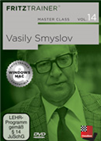Yochanan Afek (Hebrew: יוחנן אפק), born 1952 in Tel Aviv, is an Israeli chess player, composer, trainer and arbiter. He is the only person to possess international titles at five different facets of chess: International Master, International Grandmaster of chess composition, International Arbiter, FIDE master in problem solving, and International Judge for chess compositions.
Yochanan has been supplying us material for our news page for decades, articles on chess composition (here a prime example) or on events in Israel or elsewhere. It has always been interesting and a pleasure working with him. In their March issue CHESS Magazine did a 60 Seconds portrait of
Yochanan Afek
 Smyslov cultivated a clear positional style and even in sharp tactical positions often relied more on his intuition than on concrete calculation of variations. Let our authors introduce you into the world of Vasily Smyslov.
Smyslov cultivated a clear positional style and even in sharp tactical positions often relied more on his intuition than on concrete calculation of variations. Let our authors introduce you into the world of Vasily Smyslov.Born: 16th April, 1952 in Tel Aviv.
Place of residence: Amsterdam.
Occupation: Chess writer and trainer.
Enjoyable? Composing endgame studies.
And home life? I live on my own.
But sometimes good to escape to: Prague, Tel Aviv or Facebook.
Sports played or followed: Basketball, rather followed...
A favourite novel? A Tale of Love and Darkness by Amos Oz.
Piece of music? Simon and Garfunkel, The Beatles and mainly old Israeli songs.
Film or TV series? The Lives of Others (‘Das Leben der Anderen’).
What’s the best thing about playing chess? Every game is a new creative challenge.
And the worst? That real life beyond the board might become of minor significance.
Your best move? A possible candidate is the following, played against GM Arthur Kogan.
Note that you can move pieces on the diagrams, and switch on an engine (fan icon) to help with your analysis. All the games are given in a replay app at the end of this article.
19 Ba5!! Qe8. The main point remained behind the scenes: 19...Qxa5 is met by the powerful blow 20 g6!!, after which the black royal couple is threatened simultaneously following the opening of the fifth rank, in contrast to which the routine materialistic approach fails: 20 Nxe7+? Kh8 21 Rxd4 Qd8! and Black is fine.
20 Nf6+! 1-0.
It’s game over after either 20...Bxf6 21 gxf6 g6 22 Qh6 or 20...gxf6 21 gxf6+ Kh8 22 Rg7.
But less memorable than your worst move? There are too many of them, but perhaps most painful was to panic with in a last round.
30....Rd1+?? 30...Rd6!! would have drawn the game (31.Rh8+! Bxh8 32.Bh6+ Bg7 33.Bxg7+ Kg8 34.Bf6+ Kf8 35.Bg7+, etc), thereby giving me an IM norm.
31.Rxd1 Qc7 32.Bh6 Bxh6 33.Qxh6+ 1-0.
And a highly memorable opponent? Playing world-class players, especially world champions Smyslov and Tal, are always memorable souvenirs.
Favourite game of all time? Kasparov-Topalov, Wijk aan Zee 1999, which I witnessed in a state of fascination live in De Moriaan.
The best three chess books: Dvoretsky’s Endgame Manual, Kasparov’s My Great Predecessors series, and The Mammoth Book of World's Greatest Chess Games by Burgess, Emms and Nunn.
Is FIDE doing a good job? Better than ever.
Any advice for either FIDE or your national federation? I would recommend the Israeli Federation to encourage and support more classical chess events.
Can chess make one happy? Indeed, just like other fine arts.
A tip please for the club player: Solving one endgame study a day keeps blunders away!
About CHESS Magazine

The above feature is reproduced from Chess Magazine March/2023, with kind permission.
CHESS Magazine was established in 1935 by B.H. Wood who ran it for over fifty years. It is published each month by the London Chess Centre and is edited by IM Richard Palliser and Matt Read.
The Executive Editor is Malcolm Pein, who organises the London Chess Classic.
CHESS is mailed to subscribers in over 50 countries. You can subscribe from Europe and Asia at a specially discounted rate for first timers, or subscribe from North America.
























